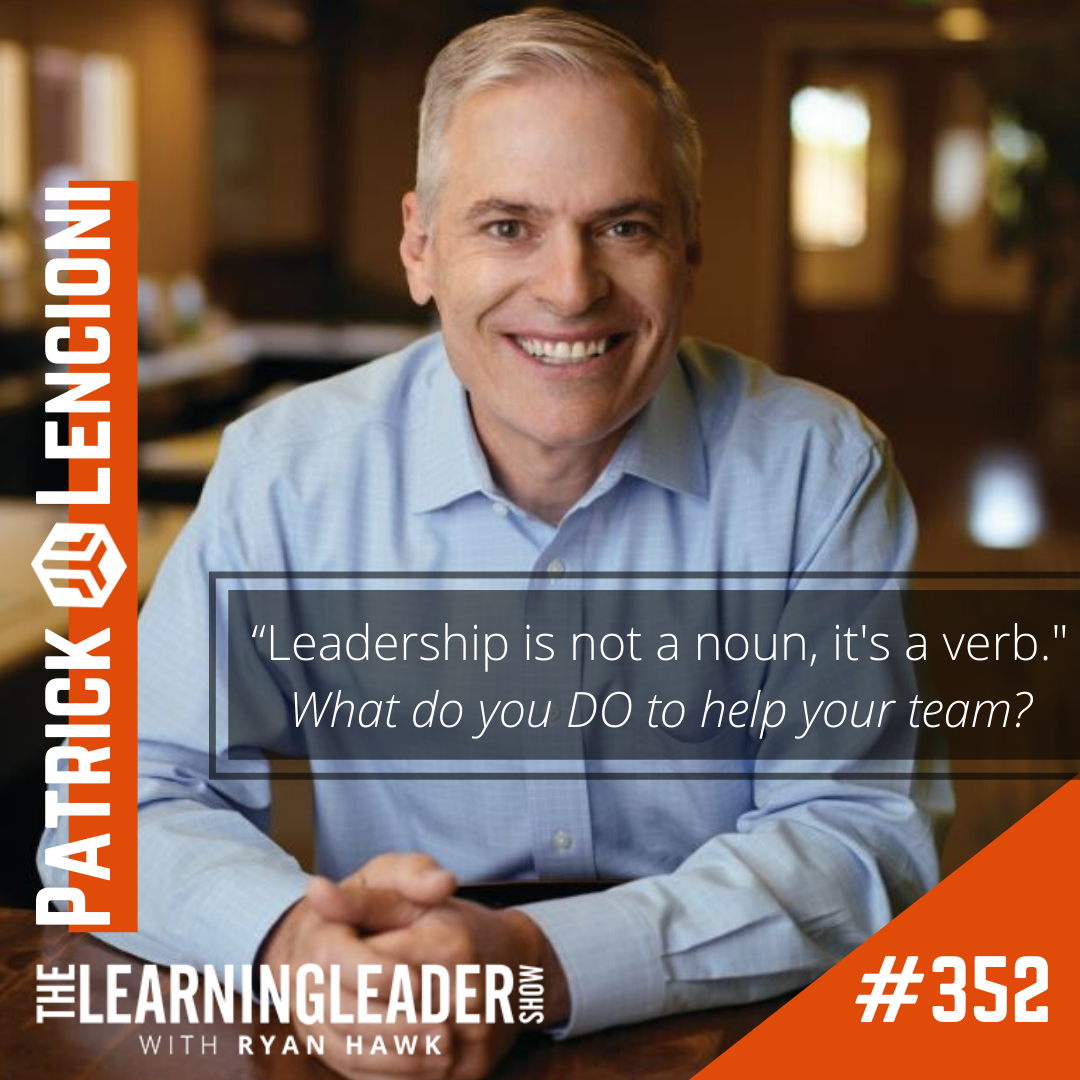Patrick Lencioni is founder and president of The Table Group, a firm dedicated to helping leaders improve their organizations’ health since 1997. His principles have been embraced by leaders around the world and adopted by organizations of virtually every kind including multinational corporations, entrepreneurial ventures, professional sports teams, the military, nonprofits, schools, and churches. Pat is the author of ten business books (The Five Dysfunctions Of A Team, The Motive, The Advantage, The Ideal Team Player) with over three million copies sold worldwide. His work has appeared in the Wall Street Journal, Harvard Business Review, Fortune, Bloomberg Businessweek, and USA Today.
Order my book: WELCOME TO MANAGEMENT
Be part of “Mindful Monday” — Text LEARNERS to 44222
Subscribe on iTunes or Stitcher Radio
The Learning Leader Show
- Leaders who sustain excellence =
- Humility – They don’t feel they are more important than others, but they realize that their words and actions carry more weight.
- “Leadership is a privilege… It’s about serving others. A lot of leaders lead because they think it looks cool.”
- “Leadership has to be about what you can give, not what you can get.”
- Exploring the two leadership motives:
- Reward-centered leadership: the belief that being a leader is the reward for hard work, and therefore, that the experience of being a leader should be pleasant and enjoyable, avoiding anything mundane, unpleasant or uncomfortable.
- Responsibility-centered leadership: the belief that being a leader is a responsibility, and therefore that the experience of leading should be difficult and challenging (though certainly not without elements of personal gratification).
- One of the questions to ask yourself:
- “How do you see your job in terms of verbs?” — what do you do to really help the business?
- The leader must be a constant, incessant reminder of the company’s purpose, strategy, values, & priorities. You’re not only the CEO, you’re the CRO.” Chief Reminding Officer
- The actions of great leaders:
- Running great meetings
- Managing the executive team
- Managing the executives as individuals
- Having difficult conversations with people
- Constantly communicating and repeating key messages to employees
- “The CEO should have the most painful job in the company.”
- For the mid-level manager — “Am I waking up with the right rationale to do this job?”
- Love is a verb:
- Time
- Affection
- Discipline
- “Leadership is not a noun, it’s a verb.”
- Running great meetings:
- “Meetings are the central activity of leadership. Bad leaders have other people run their meetings.”
- Good meetings have debate and conflict. People are able to be passionate without consequence. The leader prioritizes what will be talked about.
- “Meetings are the central activity of leadership. Bad leaders have other people run their meetings.”
- CEO’s are responsible to build teams. Your job is to build teams based on trust
- When receiving a message from a cynical leader who says “You don’t understand.” Our response? “No, we’re not going to be that way. The ones who do the hard work change the world.”
- Micro-managing vs. Accountability:
- “There is an abdication of management. You should know what your team is doing.”
- Parenting: “The great news about being a parent is it’s humbling.”
- The leader must be the chief reminding officer:
- “Constant, incessant, reminder of the company’s purpose, strategy, values, and priorities. You must over-communicate.”
- Marriage advice:
- “Be completely humble, vulnerable, especially in front of the kids. Engage in healthy conflict. When people can’t argue, that’s a problem.”
- Here is WHY joining a Learning Leader Circle is a good idea…
Resources:
- Read: WELCOME TO MANAGEMENT
- Read: The Motive
- Follow Pat on Twitter: @patricklencioni
- Be part of “Mindful Monday” — Text LEARNERS to 44222
- Connect with me on LinkedIn
- Join our Facebook Group: The Learning Leader Community
- To Follow Me on Twitter: @RyanHawk12
More Learning:
Episode 078: Kat Cole – From Hooters Waitress To President of Cinnabon
Episode 216: Jim Collins — How To Go From Good To Great
Episode #300: AJ & Keith Hawk – How To Instill Work Ethic & Curiosity In Your Children
Episode #303: General Stanley McChrystal – The New Definition Of Leadership


Leave A Comment